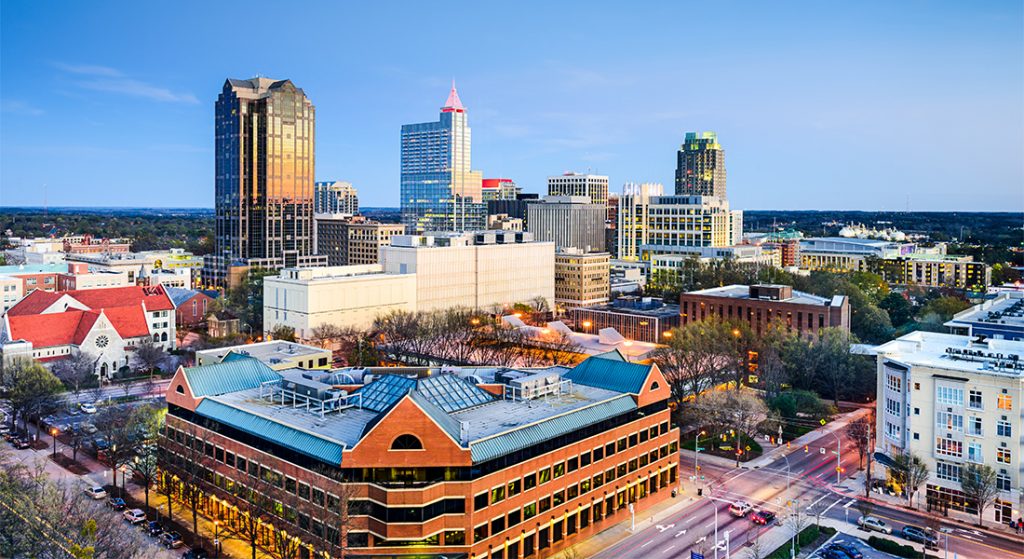A veteran site-selection executive returns to lead the state’s top agency for economic and workforce development.
Tony Copeland. Photo by John Gessner
If Tony Copeland gets his wish, North Carolina will once again be known as the “Dixie Dynamo,” a nickname coined in a 1962 National Geographic story describing the state’s newly prosperous economy.
“Just look at the talent pool here,” says Copeland, secretary of commerce for the ninth-most populous state. “We’ve done something right along the way. And I’d say education and vision and having some leaders with the ability to see and create the future has been the reason.”
After Roy Cooper was elected governor in 2016, he tapped Copeland to lead the state’s top agency for promoting and improving its economy and quality of life. The Duke University graduate is no stranger to economic development: He served as assistant secretary of the N.C. Department of Commerce from 2003-2007, ran his own site-selection firm from 2008-13, then was a partner at the Williams Mullen law firm in Raleigh until his appointment in January 2017. He inherits a strong deck of cards, with more than $4.4 billion in investment reported in the state in 2016 and more than 18,000 new jobs announced, according to the Economic Development Partnership of North Carolina’s annual Community Investment Report. Launched in 2014, the public-private agency works with Commerce on functions including recruiting jobs, marketing and promoting tourism. Copeland’s staff collaborates daily with the EDPNC, including meetings and calls with partnership CEO Christopher Chung and other staff members.
“It’s the best job in North Carolina,” Copeland says. “You’re working with government, you’re working with public policy, but you’re also working with private business, and you actually get to see the results during the tenure that you’re here.”
Copeland sat down with writer Kevin Maurer to discuss Commerce’s role in bringing economic growth to the state. Comments were edited for brevity and clarity.
HOW DOES COMMERCE WORK WITH REGIONAL DEVELOPERS AND CHAMBERS OF COMMERCE?
I call it a wraparound strategy. It takes all of us working together to move forward with jobs or opening sites. The state partners with groups such as Golden LEAF (a foundation that provides grants to rural areas once dependent on tobacco production), power companies and others. It all wraps around the project and has to work in step, often with Commerce being the lead and providing access to the Department of Transportation, Department of Environmental Quality, infrastructure monies and state incentives.
WHAT INDUSTRIES ARE RECEIVING THE MOST ATTENTION?
We’re definitely not going to lose our focus on the biotech, technology and financial sectors, many of which are clustered around the urban areas and the universities. Basically, about 15 counties have 85% of the population. One of the governor’s focuses, and a big direction of his to me, is on those 85 other counties. We have the second-largest rural population after Texas. A major focus is not only on small business but also to have them ready to bring in larger projects. For instance, in Wilson we have Bridgestone — we have over 2,000 people making tires. We should have those types of jobs in much of rural North Carolina.
HOW DO YOU CONVINCE BUSINESSES TO LOCATE IN RURAL AREAS?
We have to know what the particular rural area has, what its talent pool looks like, and what we have to do to work with them to develop it. We have to help them put in the infrastructure that they’re going to need, and it’s not only highways, but also natural gas and broadband. Then we have to have the incentives. It has to have all those things. So, we have to look at each of these counties and help basically backfill those deficits.
HOW DOES COMMERCE HELP MANUFACTURERS GROW EXPORTS?
The international trade division assists smaller companies in making connections, for example with a buyer in an international company. We have offices in Germany, Japan, China, Korea, Hong Kong, Mexico City and Canada. We also work with the Department of Agriculture in exporting North Carolina farm products.
HOW DO THE STATE’S EDUCATIONAL SYSTEMS HELP SUPPORT INDUSTRY?
First, without schoolteachers there wouldn’t be any engineers, lawyers, doctors or machinists. The K-12 [schools are] critical, to continue to invest in and develop that. The community colleges and their customized training programs are huge incentives when we bring companies in for training specific talent. The university system too is important. Look at our schools of engineering: We have
UNC Charlotte, N.C. A&T State University, Duke University, N.C. State University and now East Carolina University’s coming online. They all have different skill sets. Our textile manufacturing is always involved with N.C. State’s College of Textiles, which is one of the preeminent schools in the world. UNC Charlotte is heavily involved in composites, which are used for aviation, NASCAR and automobiles.
WHAT SERVICES DOES COMMERCE PROVIDE FOR EXISTING BUSINESSES?
A tremendous amount of our growth is through expansions of existing companies. For instance, there was an Israeli nonwoven textile company in Person County. When they first came here, they invested less than $30 million. Two years ago, they did a $180 million expansion, and part of that was continuing to work with them through existing industry services and keeping them connected.
N.C. ATTRACTED NATIONAL ATTENTION FOR HOUSE BILL 2, A CONTROVERSIAL LAW THAT ELIMINATED NONDISCRIMINATION PROTECTIONS FOR CERTAIN GROUPS. IS THE STATE REBOUNDING SINCE HB2’s REPEAL IN MARCH 2017?
With the changes that we worked on to repeal and amend what was going on with HB2, I think North Carolina’s on the right side of history. I think we see the pathway for stability. And we see companies are coming back.
